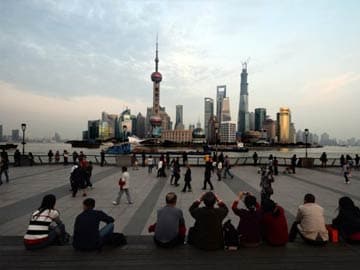
A view of Shanghai skyline
United Nations:
The number of city dwellers is at an all-time high of about 3.5 billion and will nearly double in the next 30 to 40 years, with almost all the growth in developing countries, the head of the U.N. agency focusing on cities said Monday.
Joan Clos said even though the rate of population growth is decreasing, the U.N. projects that in the next 30 years the global population will increase from 7 billion to 9 billion - and the urban population will grow between 2.5 billion and 3 billion people.
"In all human history we have reached 3.5 billion of urban settlers and in the next 30 years we are going to have 3 billion more," Clos said. "Imagine the changing rate - what we have done in all human history, we nearly will do in the next 30 to 40 years of history."
With 96 per cent of the growth of cities expected in poorer developing countries, he said, there are going to be huge demands on land, resources and services for urban residents.
Clos, a former mayor of Barcelona who is now executive director of the U.N. Human Settlements Program known as UN-Habitat, spoke at a news conference promoting the agency's upcoming World Urban Forum from April 5-11 in Medellin, Colombia which will focus on growing inequalities in urbanization worldwide.
He said 10,000 participants are expected including ministers, mayors, academics and representatives from business, non-governmental organizations and local authorities.
Currently, Clos said, the world is experiencing "the highest rate of urbanization in human history," and national and local governments don't have the capacity to address key issues including organization, governance, finance and the provision of services.
In recent decades, he said, inequalities in urban areas have led to protests and unrest as cities have faced difficulties integrating a big influx of migrants.
"This is why we are very worried, because the number of people living in slums is increasing," Clos said.
UN-Habitat said it estimates that between 2000 and 2010 a total of 227 million people in the developing world experienced improvements in their living conditions, with China and India alone accounting for 166 million, or 55.5 per cent of the global effort. This met a U.N. anti-poverty goal before the 2015 target date, Clos said.
At the same time, however, UN-Habitat said the world's slum population rose from 650 million in 1990 to 767 million in 2000, and to 828 million in 2010 and an estimated 863 million in 2012.
Clos said the cities of the world will have to handle millions of new arrivals "because they cannot hide - they cannot go away."
The challenge is whether the growth of cities can be done "in a planned and designed manner, in order to provide some basic services at affordable costs for the citizen," he said.
Otherwise, they will grow spontaneously without any planning and the number of slum dwellers will keep rising, Clos said.
Joan Clos said even though the rate of population growth is decreasing, the U.N. projects that in the next 30 years the global population will increase from 7 billion to 9 billion - and the urban population will grow between 2.5 billion and 3 billion people.
"In all human history we have reached 3.5 billion of urban settlers and in the next 30 years we are going to have 3 billion more," Clos said. "Imagine the changing rate - what we have done in all human history, we nearly will do in the next 30 to 40 years of history."
With 96 per cent of the growth of cities expected in poorer developing countries, he said, there are going to be huge demands on land, resources and services for urban residents.
Clos, a former mayor of Barcelona who is now executive director of the U.N. Human Settlements Program known as UN-Habitat, spoke at a news conference promoting the agency's upcoming World Urban Forum from April 5-11 in Medellin, Colombia which will focus on growing inequalities in urbanization worldwide.
He said 10,000 participants are expected including ministers, mayors, academics and representatives from business, non-governmental organizations and local authorities.
Currently, Clos said, the world is experiencing "the highest rate of urbanization in human history," and national and local governments don't have the capacity to address key issues including organization, governance, finance and the provision of services.
In recent decades, he said, inequalities in urban areas have led to protests and unrest as cities have faced difficulties integrating a big influx of migrants.
"This is why we are very worried, because the number of people living in slums is increasing," Clos said.
UN-Habitat said it estimates that between 2000 and 2010 a total of 227 million people in the developing world experienced improvements in their living conditions, with China and India alone accounting for 166 million, or 55.5 per cent of the global effort. This met a U.N. anti-poverty goal before the 2015 target date, Clos said.
At the same time, however, UN-Habitat said the world's slum population rose from 650 million in 1990 to 767 million in 2000, and to 828 million in 2010 and an estimated 863 million in 2012.
Clos said the cities of the world will have to handle millions of new arrivals "because they cannot hide - they cannot go away."
The challenge is whether the growth of cities can be done "in a planned and designed manner, in order to provide some basic services at affordable costs for the citizen," he said.
Otherwise, they will grow spontaneously without any planning and the number of slum dwellers will keep rising, Clos said.
Track Latest News Live on NDTV.com and get news updates from India and around the world

